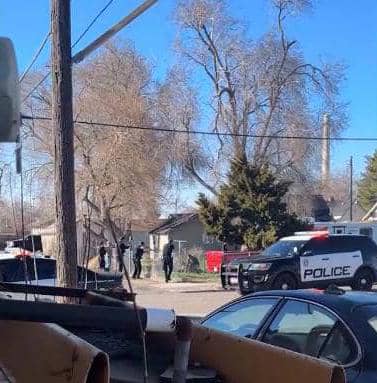News | Events | Digital PR | Advertising
A Cry for Justice: Autistic Teen’s Shooting by Police Sparks Outrage

In Pocatello, Idaho, a heartbreaking incident has left a community reeling and a family clinging to hope. On April 5, 2025, 17-year-old Victor Perez, an autistic teenager with cerebral palsy, was shot nine times by police in his own backyard. The disturbing event, captured on a neighbor’s video, unfolded in mere seconds, officers arrived, shouted commands, and opened fire as Perez, holding a kitchen knife, staggered toward a fence. Now, with Perez in a coma, his left leg amputated, and his survival uncertain, questions swirl about why lethal force was used so swiftly against a vulnerable young man.
Perez’s family paints a picture of a gentle soul with the mind of a five-year-old, nonverbal and unsteady on his feet due to his disabilities. That Saturday evening, a neighbor called 911 after seeing Perez with a knife, stumbling in his yard while a family member tried to intervene. Four officers responded, guns drawn, and within 12 seconds of arrival, they fired. Perez’s sister reportedly screamed that he was “special,” but the hail of bullets left him critically wounded. Three surgeries later, he remains on life support, his brain function under evaluation.
The Pocatello Police Department defends the officers, claiming Perez posed an “immediate risk.” Chief Roger Schei insists split-second decisions were necessary, though he admits the viral footage doesn’t tell the full story. An investigation by the Eastern Idaho Critical Incident Task Force is underway, but for many, the response rings hollow. Why weren’t Tasers—standard equipment—used? Why no attempt at de-escalation for a teen who couldn’t fully comprehend the situation?
The community’s grief has turned to action. Protests erupted outside the police station, with signs decrying the officers’ actions as excessive. A vigil is set for April 12 at Portneuf Medical Center, where Perez fights for his life. Online, a petition demands accountability, and a fundraiser supports his family’s mounting burdens. Witnesses like Brad Andres, who filmed the scene, call it a “firing squad,” lamenting the lack of compassion for a clearly struggling teen.
This tragedy echoes broader concerns about how police handle disability. As Perez’s loved ones wait by his bedside, the nation watches, wondering if justice will prevail—or if another life will be lost to a system unprepared to protect its most fragile.
Explore more
Scientists Research Nigeria’s Okra, Maize, Four Other Crops During NASA’s Space Mission
International astronauts will research six indigenous Nigerian crops and seeds during the...
President Trump Orders Pharmaceutical Companies To Cut Drug Prices Within 60 Days
President Donald Trump on Thursday said he asked major pharmaceutical companies to...
Microsoft To Become The Next $4 Trillion Company
Microsoft (MSFT.O), opens new tab soared past $4 trillion in market valuation...
U.S. Government Places $25 Million Bounty on Venezuelan President Maduro for Drug Trafficking and Other Charges
The United States government has declared Venezuela’s President Nicolás Maduro and two...












Leave a comment